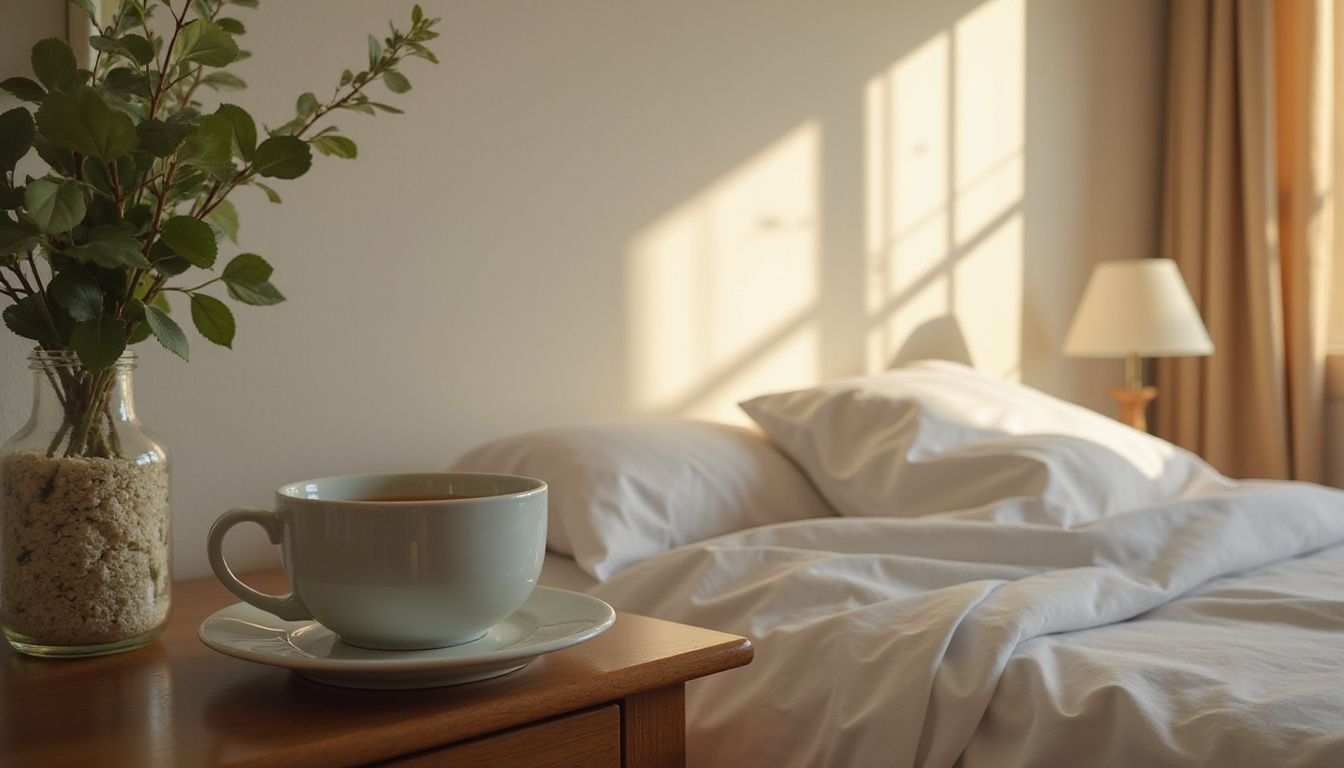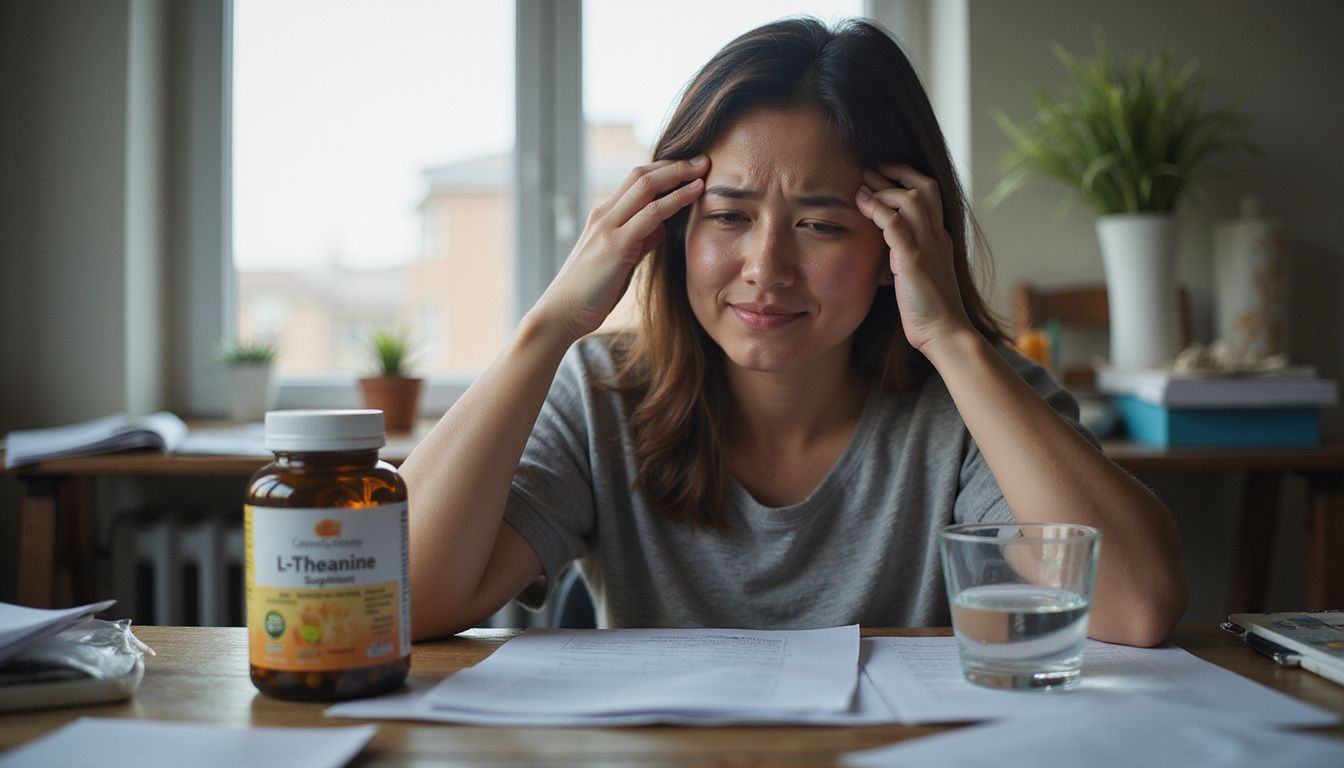Many people have trouble sleeping. L-theanine, found in green and black tea leaves, helps with this problem. This post will talk about how l-theanine for sleep can make you relax more and sleep better.
Keep reading to find out how.
How L-Theanine Works for Sleep

L-Theanine starts its work by impacting the brain. It boosts alpha waves in the brain, which makes people feel relaxed without feeling tired. This amino acid also changes levels of chemicals in the brain like serotonin and dopamine.
These changes help reduce stress and improve sleep quality.
L-Theanine promotes relaxation necessary for high-quality sleep.
Next, we will talk about the key benefits of L-theanine for getting better sleep.
Key Benefits of L-Theanine for Sleep

L-Theanine promotes relaxation, reducing stress. It improves sleep quality and duration while enhancing focus and mental clarity.
Promotes relaxation and reduces stress
L-Theanine boosts calming brain chemicals like GABA, serotonin, and dopamine. This helps your mind relax and lowers stress. It reduces the bad chemicals that make you feel stressed.
So, drinking green tea or taking L-Theanine can make you feel more at ease.
This calm feeling makes it easier to fall asleep and improves how well you sleep. Next, we’ll discuss how L-Theanine helps with sleep quality and duration.
Improves sleep quality and duration
Taking 200 mg of L-theanine before bedtime can make sleep better. Studies show this dose helps people relax. This makes it easier to fall asleep and stay asleep longer. Tools like Actigraphs and questionnaires help researchers see these changes in sleep.
Better sleep also means you wake up feeling more rested. Less stress at bedtime means higher quality rest. People dealing with insomnia or trouble falling asleep find this very helpful.
Next, we look at how L-theanine boosts focus and mental clarity.
Enhances focus and mental clarity
L-Theanine boosts attention, memory, and learning by reducing stress hormones. This helps the mind stay sharp and clear. Stress often gets in the way of thinking straight. But L-Theanine makes it easier to focus and recall information.
L-Theanine enhances mental functions by promoting alpha brain wave activity.
It leads to better performance at work or school by keeping you alert but calm. This is especially helpful during long tasks that require a lot of attention.
Recommended Dosage of L-Theanine for Sleep

To enhance the advantages of L-theanine for sleep, it’s crucial to carefully evaluate the right dosage and timing. Delving into this can assist in boosting your sleep quality and overall well-being.
Typical dosage ranges
The right dose of L-theanine for sleep is 200 mg each day. This amount helps most people feel more relaxed and sleep better. You can safely take up to 500 mg a day if you are healthy.
Taking this much has not caused problems in studies. It’s important to stick to these doses whether you’re dealing with stress, having trouble sleeping, or just want to improve the quality of your rest.
Some people might need less L-theanine to see benefits. Start with a lower dose and see how it works for you. If needed, you can slowly increase the amount until you reach the recommended dosage or find what works best for your body without taking too much.
Always pay attention to how your body reacts and adjust from there.
Timing for optimal results
For best results, take L-theanine 30-60 minutes before you plan to sleep. This timing helps because the body reaches peak concentration of L-theanine about 60 minutes after you take it.
So, if you align this with your bedtime, you help make sure that L-theanine works well as a sleep aid during the time when your body is ready to rest.
Taking L-theanine at this specific time can also help reduce the time it takes for you to fall asleep. Since difficulty falling asleep is a common issue, properly timing your dose can greatly impact how quickly and well you sleep.
By following these guidelines, you ensure that L-theanine has enough time to work in your system and promote better sleep quality and duration.
Potential Side Effects of L-Theanine

L-Theanine may cause headaches in some people, but it’s still worth learning more about its potential side effects.
Common side effects
Most people who take L-theanine don’t have bad reactions. It’s safe for many and doesn’t make you sleepy during the day. You can drink it anytime, which makes it easy to fit into your daily routine.
L-theanine is generally well-tolerated, making it a reliable choice for those looking to improve their sleep without unwanted drowsiness.
Yet, a few might feel headaches or signs of being sick. These issues are rare and usually mild. If you notice any uncomfortable effects after taking L-theanine, consider talking to a health expert.
They can give advice on whether you should keep using it or try something else for better sleep.
Rare adverse reactions
L-Theanine is safe for most people, but a few may face rare side effects. These uncommon reactions can include allergic responses. People with allergies to tea leaves might have issues since L-theanine comes from the same source.
Also, those with low blood pressure should be careful. L-Theanine can lower blood pressure further, which might cause problems.
Some individuals taking medicine for high blood pressure or being treated for heart disease need to watch out too. Mixing L-theanine with these medicines might affect how well they work.
Always talk to a doctor before starting L-theanine if you’re on medication.
Next, let’s look at the safety of using L-Theanine over time.
Safety of L-Theanine Usage
L-Theanine is generally safe for most people when taken in appropriate amounts. To learn more about the safety of using L-theanine, please read the full blog post.
Long-term use considerations
L-Theanine is seen as a safe, natural way to help with sleep for most healthy adults. There’s no big concern about using it for a long time. Still, people should talk to healthcare providers if they plan on using it often or with other sleep aids.
This is important for those who are pregnant, breastfeeding, or have health issues like high blood pressure or diabetes.
Next up is when to consult a healthcare provider before adding L-theanine to your routine.
When to consult a healthcare provider
Consult a healthcare provider before using L-theanine if you are pregnant or breastfeeding. Moreover, seek advice from a physician for children under medical advisement regarding the use of this supplement.
Individuals with low blood pressure should also seek medical guidance before taking L-theanine as it may affect their condition.
Combining L-Theanine with Other Sleep Aids
Combining L-Theanine with Other Sleep Aids can enhance its effectiveness in promoting relaxation and improving sleep quality. For more insights, read the full blog post on the benefits of L-theanine for sleep.
L-Theanine and melatonin
L-Theanine and melatonin are often combined to enhance sleep. Melatonin, usually taken in doses of 1-10 mg per day, aids in falling asleep and improving sleep quality. Conversely, L-theanine promotes relaxation and reduces stress levels.
Products like Nature Made Wellblends Sleep Longer Tablets contain both L-theanine (100 mg) and time-release melatonin (10 mg) to extend and improve sleep while offering a calming effect for better relaxation before bedtime.
Moving on to – Suggested L-Theanine Dosage for Sleep…
L-Theanine and GABA
L-Theanine and GABA both impact the brain. L-Theanine, obtained from tea leaves, encourages calmness and reduces stress. It aids in improving sleep and concentration, while also enhancing mental clarity.
In contrast, GABA, a neurotransmitter, inhibits certain brain signals to induce relaxation. These two elements work in tandem to soothe the mind, resulting in better sleep quality and enhanced cognitive function.
For example, Nature Made Wellblends Sleep Longer Tablets include 100 mg of L-theanine and 100 mg of GABA, offering a favored choice for those seeking improved sleep. Both L-Theanine and GABA possess calming effects that can improve sleep quality by soothing the mind.
Conclusion
L-Theanine, a natural compound found in tea leaves, provides various advantages for enhancing sleep. It fosters calmness, alleviates tension, and boosts cognitive function without inducing drowsiness.
Studies endorse its safety and efficacy within suggested doses but recommend seeking medical advice before usage. This adaptable supplement could supplement other sleep aids such as melatonin or valerian root for improved sleep quality overall.
With chronic sleep disorders gaining more recognition as public health issues associated with different chronic diseases, safe supplements like L-theanine are becoming more essential in effectively addressing these concerns.

